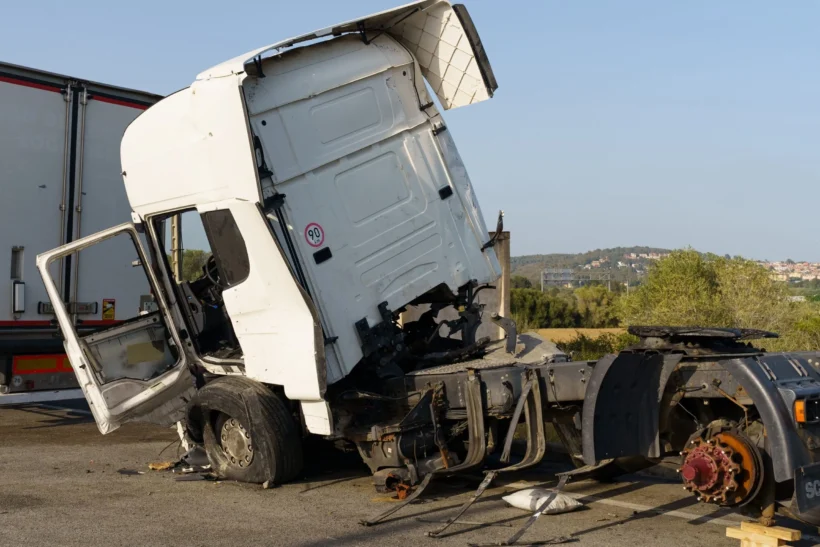In the aftermath of a truck accident, understanding what happened is of paramount importance. Black box data, often associated with aviation, plays a crucial role in shedding light on truck accidents too. In this article, we will delve into the significance of black box data in the context of truck accidents, outlining its definition, role in accident investigations, information gathering process, and its impact on liability and insurance claims.
Definition of Black Box Data

Black box data, also known as an Electronic Control Module (ECM) in trucks, serves as a silent witness to the events leading up to an accident. Its primary purpose is to record critical information about the vehicle’s performance, much like the black boxes in airplanes. These electronic recorders capture a wide range of information, including vehicle speed, engine RPM, braking, and even seatbelt usage. In essence, black box data acts as the digital memory of the truck, providing insights into its operation.
Role in Accident Investigations
When a truck accident occurs, investigators rely heavily on black box data to piece together the puzzle. This information serves as an unbiased source of information, helping determine the cause of the accident. For instance, it can reveal if the truck was traveling at an unsafe speed, if the brakes were applied, or if the driver swerved abruptly. Understanding these details is pivotal in reconstructing the accident and establishing accountability.
Gathering Black Box Data
Collecting black box data after a truck accident involves a meticulous process. First and foremost, it is essential to preserve the data for analysis. Investigators secure the ECM and extract the information it holds. This process is akin to retrieving the black box from an aircraft wreckage. Preserving the information ensures that no crucial evidence is lost, and it can be analyzed comprehensively to uncover the truth. Once the data is collected you’d be wise to hire Chicago truck accident attorneys.
Understanding Speed and Location Data
Black box data goes beyond just numbers; it provides valuable insights into the truck’s speed and location at the time of the accident. This information can be used to reconstruct the accident with precision. For instance, it can determine if the truck was exceeding the speed limit, if it was on a curve or a straight road, and even if it was in a construction zone. Such details are instrumental in understanding the dynamics of the accident.
Impact on Liability

In legal proceedings following a truck accident, black box data can tip the scales of liability. It can reveal whether the truck driver adhered to safety regulations or if other factors contributed to the accident. This information can be a game-changer, as it provides concrete evidence of the truck’s behavior leading up to the collision. It can either exonerate the driver or establish their negligence, making it a pivotal tool in determining liability.
Importance in Insurance Claims
The significance of black box data extends to insurance claims as well. When filing an insurance claim after a truck accident, the data from the ECM can impact the outcome significantly. Insurance companies rely on this information to assess the extent of liability and the validity of claims. If the information shows that the truck driver was at fault, it can lead to increased premiums for the driver’s insurance, emphasizing the practical implications of this data beyond the legal realm.
Enhancing Safety Measures
Analyzing black box data is not just about assigning blame; it’s also about enhancing safety measures. By studying the information recorded by the ECM, trucking companies can identify patterns of behavior that may lead to accidents. For example, if data consistently shows drivers exceeding speed limits, companies can implement training programs or technology solutions to address this issue proactively. Ultimately, this information-driven approach can help prevent future accidents and save lives on the road.
Legal Regulations
The use of black box data in the trucking industry is not a matter of choice; it is governed by legal regulations. In the United States, the Federal Motor Carrier Safety Administration (FMCSA) mandates the use of Electronic Logging Devices (ELDs) in most commercial vehicles to record driving hours accurately. These regulations also specify the requirements for information retention and access. Non-compliance with these regulations can result in fines and penalties, making it imperative for trucking companies to adhere to the law when it comes to black box data.
Privacy Concerns
While black box data is undeniably valuable for safety and accountability, it also raises privacy concerns. Drivers may worry about their every move being monitored, and there is a delicate balance to strike between safety and privacy. Stricter regulations and clear policies are needed to ensure that the collection and use of black box data are carried out responsibly and with respect for individuals’ privacy rights. Finding this balance is essential to maintain trust within the industry.
Real-Life Case Studies
To illustrate the real-world impact of black box data, let’s look at a couple of case studies. In a high-profile truck accident case, the black box information revealed that the driver had been consistently violating driving hour regulations, leading to driver fatigue as a significant factor in the accident. This information played a crucial role in the legal proceedings, ultimately holding the trucking company accountable for not monitoring their driver’s compliance with safety regulations.
In another case, black box data showed that the truck’s brakes had not been properly maintained, resulting in a catastrophic brake failure leading to the accident. This information shifted liability away from the driver and squarely onto the shoulders of the trucking company for their negligence in maintaining their vehicles.
Conclusion

In conclusion, black box data is a critical component in understanding truck accidents. It provides a wealth of information that helps determine the cause of accidents, establish liability, and facilitate fair insurance claims. Furthermore, it serves as a tool for improving safety measures and preventing future accidents. However, it is crucial to navigate the legal and privacy aspects of black box information responsibly. As we continue to rely on this technology, its role in ensuring road safety and accountability cannot be overstated.

